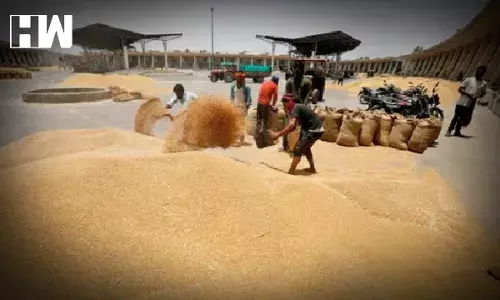New Delhi: India expressed concern on Wednesday about food grain hoarding and discrimination in the wake of a “sudden increase” in food prices, warning the West that the issue should not follow the example of the Covid-19 vaccine, for which poor countries struggled to get even the first doses while rich countries had an excess of what they needed.
V Muraleedharan, Minister of State for External Affairs, stated that the Indian government is aware of the abrupt rise in global wheat prices, which threatens “our food security as well as that of our neighbors and other vulnerable nations.”
“It is necessary for all of us to adequately appreciate the importance of equity, affordability and accessibility when it comes to food grains,” he said.
“We have already seen to our great cost how these principles were disregarded in the case of Covid-19 vaccines. Open markets must not become an argument to perpetuate inequity and promote discrimination,” Mr Muraleedharan said.
Mr Muraleedharan said that India’s decision to restrict wheat exports will ensure it can ‘truly’ respond to those most in need. “We are committed to ensuring that such adverse impact on food security is effectively mitigated and the vulnerable cushioned against sudden changes in the global market,” he said.
The minister also emphasized India’s “track record” of assisting its allies in need, claiming that the country has never been found wanting, even in the midst of the Covid-19 pandemic and continuous conflicts.
“We have provided food aid in the form of thousands of metric tonnes of wheat, rice, pulses, and lentils to several countries, including our neighbourhood and Africa, to strengthen their food security,” he said, adding that in view of the deteriorating humanitarian situation in Afghanistan, India is donating 50,000 metric tonnes of wheat to its people.
India banned wheat exports on May 13 in an effort to keep high prices in check amid a wheat shortfall caused by a searing heat wave.
The order had three main goals: to assure India’s food security and control inflation, to assist other nations facing food shortages, and to retain India’s supplier reliability.
Wheat exports will be allowed on the basis of permission granted by the central government, according to the Directorate General of Foreign Trade (DGFT), which announced the decision last week.”Besides, the government will allow exports on requests from other countries,” it said.
“Let me make it clear that these measures allow for export on the basis of approvals to those countries which are required to meet their food security demands. This will be done on the request from the concerned governments. Such a policy will ensure that we will truly respond to those who are most in need,” Mr Muraleedharan said.
As an independent media platform, we do not take advertisements from governments and corporate houses. It is you, our readers, who have supported us on our journey to do honest and unbiased journalism. Please contribute, so that we can continue to do the same in future.

